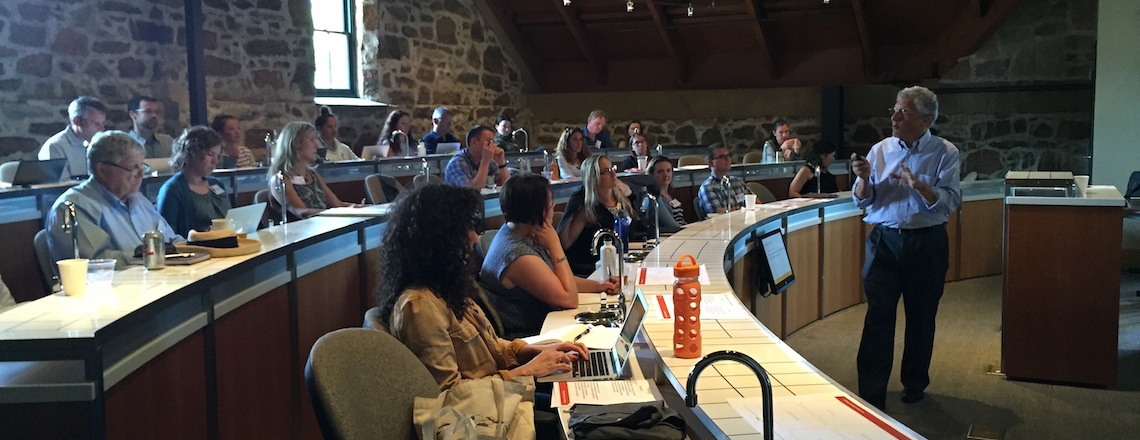News



Why a culinary school decided to bridge business and education
Washington Post | Posted: 07/23/2015
View original article here.
Photo Credit: Food Business School
[ssba]
Press Release



Why a culinary school decided to bridge business and education
Posted: 07/23/2015
Food safety, waste and climate change may not be on the mind of your average diner, but in the food industry, they are the most pressing issues of our day. That’s not lost on the Culinary Institute of America, which this year launched a start-up in Northern California: a business school for chefs and food producers. Tuition ranges from $400 for a course to almost $4,000 for an intensive retreat. You can’t get a master’s degree in food studies — certificates are all the school awards right now — but such a program could be in the pipeline. The Food Business School held its first intensive course last month at the CIA’s Napa Valley castle of a campus, Greystone. At the helm is dean and founder William Rosenzweig, whose résumé has included turns at Odwalla, Stoneyfield Farm and the Republic of Tea. It was at Odwalla in 1996 that Rosenzweig had his first brush with a food safety crisis: The company got a call from the Seattle health department informing it that about a dozen people had taken ill in an E. coli outbreak. “The one thing they had in common,” Rosenzweig recalled being told, “was they drank your juice.” The Odwalla crisis led to sweeping changes at the company, but the more meaningful takeaway for Rosenzweig was that as young food businesses grow — even socially conscious ones such as Odwalla, which at that time sold unpasteurized juices — factors from sourcing to the agricultural impact of California’s epic drought to hygiene in far-flung factories will matter. Food “attracts a lot of people who just want to go do it,” Rosenzweig says. People who understand entrepreneurship, not so much. The school, he says, will employ business-school methods, encouraging students to use the classroom setting to forge their own business plans and innovations. To that end, its partners include Stanford University, the University of California’s Berkeley and Davis campuses, and business heavyweights such as Google and Unilever. Chefs such as Michael Chiarello and packaged-food and restaurant consultants are joining the faculty. Rosenzweig recently discussed the school’s plans with staff writer Lavanya Ramanathan. Excerpts from their conversation follow. How did you arrive at the idea of a stand-alone school focused on food and the food business? It was catalyzed by the Culinary Institute of America. Historically, the Culinary Institute has produced chefs: people who cook in restaurants or manage food-service operations. But an increasing number of them were seeing their role in other businesses: as research culinary professionals, as “food-experience designers,” as people going into food and tech, even agriculture. So there was something clearly going on in the millennial audience: increased interest in innovation. What businesses are people coming to the Food Business School saying they want to start? Is it large-scale operations, is it groceries, is it food trucks? Everything. You’ve had the growth of the “grocerant” business, and food companies like Blue Apron. You’ve had healthier food concepts like Sweetgreen: people inspired to break out of the traditional mold of being a chef at a Marriott or in a big food-service organization. The first class was in June. It was called “Scale Up Your (Authentic) Food Business,” and we had 25 entrepreneurs who had already started or were well into their food businesses. They were anywhere from half a million dollars in sales to $5 million in sales. All the entrepreneurs were at kind of a decision point. A lot of early-stage food businesses grow out of the vision and passion of their founders. Look at Clif Bar, Odwalla, Ben & Jerry’s or Whole Foods, for that matter: They start with an authentic set of values and practices, and that manifests in the company’s products and culture. One of the things that’s challenging for food companies as they scale up is you want to make sure you preserve and protect those attributes of your business that make it special. What are the challenges of working with folks who aren’t coming from a business background? We’re going to focus on helping people get that kind of experience. We’re developing a course on restaurant operations mastery, so that a young chef that’s opened a restaurant can become a good business person, too. That’s a very important need. How does the school set itself apart from the existing educational resources that are out there? We bring this sort of Silicon Valley ecosystem and mind-set to all of this. It’s much faster, it’s much leaner, it’s much more experimental and organic. All of our education is experiential or practice-based. In the fall, we’ll roll out our online courses. These are kind of essential courses. One is about the legal fundamentals that a food entrepreneur should be aware of: how to structure your business, how to finance your company, how to be sure you’re in compliance with regulations. We’re also developing a course called “Develop Your Moral Compass.” There are a lot of critical decision points for entrepreneurial leaders to make when they’re dealing with food, a substance people put in their mouths. The responsibility is great. What are the other big issues that the food industry is facing? The healthiness of our menu. We’ve been a culture that’s developed into a protein, meat-centric [one], and that’s not sustainable. That’s a huge issue. How do you shift habits? We realize now that we waste an enormous amount of food, whether it be at home or in supply chains. We’ve come to expect our produce and our fruits to be unblemished when they get to us at the market. They’re almost created at a level of illusion. You have climate, you have drought. You have opportunities now to innovate in terms of how water is managed, the way it’s reused in agriculture. The last thing worth mentioning is the whole “Internet of things.” In the next few years, all your kitchen appliances will communicate in some way; they will speak to each other. You can go to Yummly and search a recipe, turn a recipe into a shopping list and turn that shopping list into a purchase order. In the future, your kitchen will keep track of what you bought, what you used and what the inventory is in your fridge. This sounds a little bit sci-fi. But it’s all coming.[ssba]



